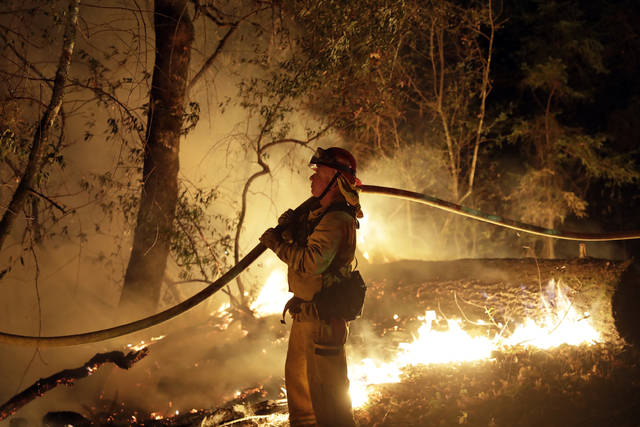SACRAMENTO, Calif. — Investigators said Thursday that a 2017 wildfire that killed 22 people in Northern California wine country was caused by a private electrical system, not equipment belonging to embattled Pacific Gas & Electric Corp.
The state firefighting agency concluded that the blaze started next to a residence. It did not find any violations of state law.
“I eliminated all other causes for the Tubbs Fire, with the exception of an electrical caused fire originating from an unknown event affecting privately owned conductor or equipment,” CalFire Battalion Chief John Martinez wrote in his report.
Some details about the property, including its owner and address, were blacked out of the report. It said the Napa County property about 3 miles (5 kilometers) north of Calistoga was built in 1946 on about 10.5 acres (4.2 hectares) with a wine cellar, pool and several outbuildings.
The fire was one of more than 170 that torched the state in October 2017. It destroyed more than 5,600 structures over more than 57 square miles (148 sq. kilometers) in Sonoma and Napa counties.
PG&E previously said it plans to file for bankruptcy protection next week, citing billions of dollars in potential damages from lawsuits linking its equipment to other deadly blazes for which it has been determined to be at fault.
The company said in a statement that despite Thursday’s finding, PG&E “still faces extensive litigation, significant potential liabilities and a deteriorating financial situation.”
Trading of PG&E Corp. stock was halted twice after news about the cause of the fire prompted a surge of buy orders. Once trading resumed, the price rocketed up, closing up $5.96, or nearly 75 percent, at $13.35 a share.
A state senator said that just because a private electric line caused the wine country fire does not let the utility off the hook for the role of its equipment in other devastating fires in the state.
State Sen. Bill Dodd, a Napa Democrat, cited systemwide issues plaguing California’s largest utility.
Lawmakers are under pressure to find a solution that addresses utility reform and compensates wildfire victims.
“This underscores the idea that we all have a role to play in wildfire prevention,” said Dodd a frequent critic of PG&E, who noted that the company has already been found at fault for more than a dozen other Northern California wildfires.
PG&E said in a Jan. 2 court filing that it believed a handyman performing unlicensed electrical work started the wine country fire.
In the report released Thursday by the state, one witness reported seeing a transformer explode. Another reported seeing the fire approach a PG&E power pole.
One witness, Charlie Brown Jr. of Calistoga, said the electrical wiring leading from the property where investigators concluded the fire started had not been used in years.
PG&E previously identified the owner of the Napa County compound as Ann Zink. In court filings, the utility said it provided electricity to Zink’s property by a line that connected to a service riser.
The utility said Zink had a private system to carry power to other buildings as well as equipment such as a water pump and water storage tank.
PG&E said it had no responsibility to maintain or inspect the private system.
Zink, 91, told The San Francisco Chronicle in 2017 that her house was unoccupied at the time of the fire and she was at her other home in Riverside County when the blaze began.
———
Associated Press writers Janie Har and Juliet Williams in San Francisco contributed to this report.


